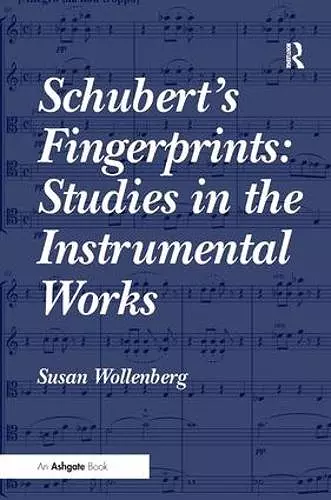Schubert's Fingerprints: Studies in the Instrumental Works
Format:Hardback
Publisher:Taylor & Francis Ltd
Published:28th Nov '11
Currently unavailable, and unfortunately no date known when it will be back
This hardback is available in another edition too:
- Paperback£56.99(9781138245709)

As Robert Schumann put it, 'Only few works are as clearly stamped with their author's imprint as his'. This book explores Schubert's stylistic traits in a series of chapters each discussing an individual 'fingerprint' with case studies drawn principally from the piano and chamber music. The notion of Schubert's compositional fingerprints has not previously formed the subject of a book-length study. The features of his personal style considered here include musical manifestations of Schubert's 'violent nature', the characteristics of his thematic material, and the signs of his 'classicizing' manner. In the process of the discussion, attention is given to matters of form, texture, harmony and gesture in a range of works, with regard to the various 'fingerprints' identified in each chapter. The repertoire discussed includes the late string quartets, the String Quintet, the E flat Piano Trio and the last three piano sonatas. Developing ideas which she first proposed in a series of journal articles and contributions to symposia on Schubert, Professor Wollenberg takes into account recent literature by other scholars and draws together her own researches to present her view of Schubert's 'compositional personality'. Schubert emerges as someone exerting intellectual control over his musical material and imbuing it with poetic resonance.
'In the ongoing project to refute earlier writers' characterization of Schubert as "less than Beethoven", Susan Wollenberg's analytical study is among the most important new entrants into the field. Everyone who listens to Schubert's instrumental compositions soon becomes aware of a unique style, one composed of an intricate mesh of particular rhythmic and metrical practices, formal procedures, tonal processes, harmonic thumbprints, and much more. Wollenberg devotes a chapter to each of Schubert's foremost predilections, with - one of this book's many strengths - ample attention to exceptions. Those who read this beautifully written book will emerge from it with a much greater understanding of what makes Schubert so great.' Susan Youens, University of Notre Dame, USA 'Those in the fields of musicology and music theory who are studying Schubert or who have a scholarly focus on the music will welcome this important new contribution to Schubert research... Highly recommended.' Choice 'This book organizes and develops the discussion of various areas of Schubert’s style in new directions. Freed from the pre-conceptions of the Beethovenian aesthetic, Schubert is allowed to be assessed as a master composer on his own terms. This is recommended reading for all who wish to stay abreast of modern Schubert scholarship.' The Schubertian 'Wollenberg’s authoritative and richly detailed attempt to put several of Schubert’s most distinctive fingerprints under the analytical microscope results in a valuable contribution to our understanding of a composer whose formal complexity and coherence remain relatively unexplored.' Notes '... erudite and enlightening...' The Musical Times '... what shines through on every page is Wollenberg’s deep knowledge of Schubert’s music, as she draws subtle connections across the history of his output. Her numerous reconstructions of what Schubert might have written, had he been inclined to follow common practice, illuminates what make
ISBN: 9781409421221
Dimensions: unknown
Weight: 771g
338 pages